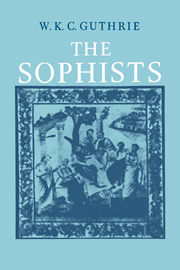Book contents
- Frontmatter
- Contents
- List of Abbreviations
- Preface
- I INTRODUCTION
- II TOPICS OF THE DAY
- III WHAT IS A SOPHIST?
- IV THE ‘NOMOS’ – ‘PHYSIS’ ANTITHESIS IN MORALS AND POLITICS
- V THE SOCIAL COMPACT
- VI EQUALITY
- VII THE RELATIVITY OF VALUES AND ITS EFFECTS ON ETHICAL THEORY
- VIII RHETORIC AND PHILOSOPHY (Seeming and being, believing and knowing, persuading and proving)
- IX RATIONALIST THEORIES OF RELIGION: AGNOSTICISM AND ATHEISM
- X CAN VIRTUE BE TAUGHT?
- XI THE MEN
- Bibliography
- Index of passages quoted or referred to
- General Index
- Index of selected Greek words
IX - RATIONALIST THEORIES OF RELIGION: AGNOSTICISM AND ATHEISM
Published online by Cambridge University Press: 05 August 2015
- Frontmatter
- Contents
- List of Abbreviations
- Preface
- I INTRODUCTION
- II TOPICS OF THE DAY
- III WHAT IS A SOPHIST?
- IV THE ‘NOMOS’ – ‘PHYSIS’ ANTITHESIS IN MORALS AND POLITICS
- V THE SOCIAL COMPACT
- VI EQUALITY
- VII THE RELATIVITY OF VALUES AND ITS EFFECTS ON ETHICAL THEORY
- VIII RHETORIC AND PHILOSOPHY (Seeming and being, believing and knowing, persuading and proving)
- IX RATIONALIST THEORIES OF RELIGION: AGNOSTICISM AND ATHEISM
- X CAN VIRTUE BE TAUGHT?
- XI THE MEN
- Bibliography
- Index of passages quoted or referred to
- General Index
- Index of selected Greek words
Summary
CRITICISMS OF TRADITIONAL RELIGION
The Presocratic philosophers, whether or not they retained a belief in a divine force or forces, all alike promulgated conceptions of religion which were far removed from the anthropomorphism of the popular or state cults based on the Homeric pantheon. Xenophanes openly attacked them, and substituted a non-anthropomorphic monotheism or pantheism, while others tacitly abandoned them in favour, first, of an ever-living world-stuff described vaguely as governing or steering the motions of the cosmos and everything in it, and later, in Anaxagoras, of a single Mind separate from the matter of the universe and the cause of the rational order which it displays. We have seen Heraclitus condemning phallic and other cults for their unseemliness and Democritus (doubtless under the influence of already existing evolutionary theories) claiming that it was only the alarming nature of thunder, lightning and similar phenomena that made men think they were caused by gods. As ‘enlightenment’ grows, it shows itself under two main aspects (whether in ancient Greece or Europe since the Renaissance): first, the determination to believe only what is reasonable and a tendency to identify reason with positivism and the progress of natural science, and secondly a genuine concern with morality. Morality is identified with the amelioration of human life and the elimination of cruelty, injury and all forms of exploitation of human beings by their fellows, and is based on purely humanistic and relative standards, for it is held that absolute standards claiming supernatural authority not only have led in the past, but must inevitably lead, to cruelty, intolerance and other evils. The Greek gods were very vulnerable in both these aspects, and as soon as conventional piety began to yield to a more thoughtful attitude—when nomos in all its aspects was no longer taken for granted but rather contrasted with what was natural and universal—scepticism and disapproval began to make themselves felt in increasing volume.
- Type
- Chapter
- Information
- A History of Greek Philosophy , pp. 226 - 249Publisher: Cambridge University PressPrint publication year: 1977



